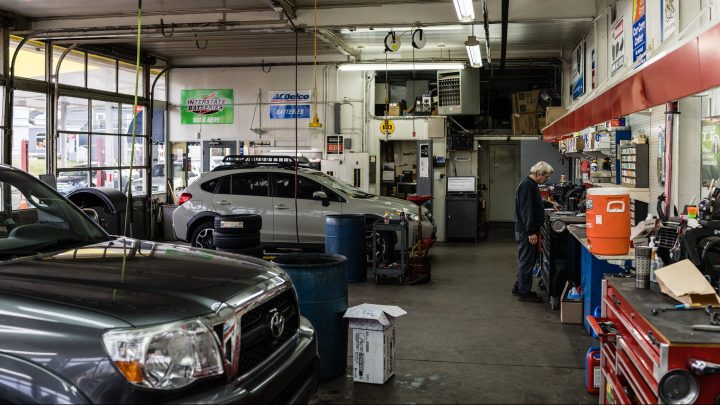
Why have car repairs gotten so expensive?

Everything about owning a car has gotten more expensive in the last couple of years. That includes buying a car in the first place, new or used; it includes interest rates on car loans, the cost of car insurance and the cost of fixing it when it breaks.
Even as inflation has slowed in recent months — it’s now 3%, down from 9% last summer — the cost of car maintenance and repairs has continued to rise, fast. It’s almost 20% more expensive to fix a car now than it was a year ago.
That’s if you can even find someone to do it. Kristin Dziczek, an automotive policy advisor at the Federal Reserve Bank of Chicago, had trouble recently when something went wrong with her son’s car.
“The check engine light went on, and I’m like, ‘You’re not going to drive that to college before we get that fixed,’” she said. “And I called around, and a couple places couldn’t even get me in to get it evaluated until mid-September.”
She found a place, eventually, but it took some work.
“Car mechanics and repair technicians have been in tight supply for a long time,” Dziczek said. But now, more than ever, “there’s a tight labor market. Wages have gone up, hours have gone up.”
That’s one reason it’s gotten more expensive to repair cars. But it’s not just labor, it’s parts, too.
“There’s a lot of things that have really doubled and tripled in price,” said David Long, who owns Omega Auto Clinic in Newton, Kansas. “Like R-134a freon to charge up people’s air conditioners — it used to be $90 a bottle, now it’s $500.”
Car batteries used to run him about $100. Now, they’re closer to $200.
“Really just any kind of parts I’ve ordered, starters, alternators,” he said. “Even fluids — oil, transmission fluid.”
It’s also not unusual to get a car in, find it needs a certain part, maybe a catalytic converter, “and you look it up, and it says out-of-stock, national back order,” Long said. “So, if you do find someone that does have the parts they know they’re the only ones selling those, and they may mark them up pretty heavily.”
As with everything when it comes to inflation, a lot of the rising cost of car repair boils down to supply and demand. That and residual pandemic issues, with both parts and labor.
But there’s another big, non-pandemic reason: newer cars are more complicated to fix.
“Almost anything you touch now is coupled to something else, or has sensors embedded in it, whether it’s bumpers, or rear-view mirrors,” said K. Venkatesh Prasad, senior vice president of research and chief innovation officer at the Center for Automotive Research.
So often now, a seemingly minor issue becomes a big, expensive repair.
“Let’s say your side view mirrors got damaged as you were entering a garage. Just five years ago it would have been a relatively easy replacement, pure mechanical,” he said. “Now it involved a camera sitting in that side view mirror, and that camera unit was controlled with a microchip somewhere.”
That means there are more parts to fix, that are more expensive, and the work itself is going to take longer, which means you’re going to get charged more for labor, too.
“Everything’s tied together now on a network inside the car like a computer. And it’s not just individual bits and pieces anymore,” said Long.
He had a customer come into his shop recently because their car radio wasn’t working, “and what we found out was the radio was fine. But it needs to talk to the computer that controls the multimedia interface for the car. That computer was bad,” he said. “And the computer was $2,000. And then taking it all apart, getting to it, it was going to be $3,000 or $4,000. Back in the day you could just replace your radio.”
For a couple hundred dollars.
On his YouTube channel, “Car Wizard,” Long often makes videos now explaining why car repairs are getting so much more expensive.
“Today we’re going to continue the series of, ‘my WHAT is broken?’” he said in a recent one. “We’re going to talk about how this little black box can cost you $1,000, possibly $2,000.”
The black box he’s holding up in the video is an actuator, a little motor that helps control the car’s heat and air conditioning.
“Back in the old days, when you would change the temperature or the floor or vent defrost and all those things on your HVAC control head, it would literally have these metal cables that would physically just open and close the flaps and doors and things,” he said. “There was no electronics involved, it was all mechanical, and they rarely ever broke. And when they did it wasn’t that big of a deal.”
Now, he explains in the video, it’s all electronic. And it’s crammed way up inside the dashboard where it’s hard to access and expensive to fix.
And this is the future. As cars get more high tech.
“I’ve told people, in the past, where we were used to $500 repairs, $600 repairs, maybe $1,000 if something’s bad, I told them in the next coming years, we need to start preparing for $2,000, $5,000, $10,000 repairs,” Long said. “That’s what it’s going to take to fix cars.”
There’s a lot happening in the world. Through it all, Marketplace is here for you.
You rely on Marketplace to break down the world’s events and tell you how it affects you in a fact-based, approachable way. We rely on your financial support to keep making that possible.
Your donation today powers the independent journalism that you rely on. For just $5/month, you can help sustain Marketplace so we can keep reporting on the things that matter to you.











